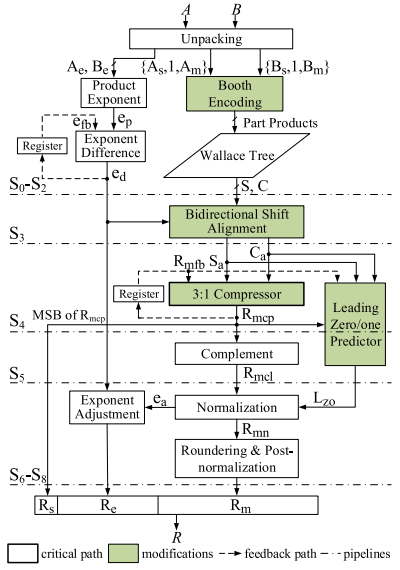A High-Speed Floating-Point Multiply-Accumulator Based on FPGAs
Also Available Domains Xilinx Vivado|Xilinx ISE
Objective
The main objective of this project is to design a floating point multiply accumulator which comprises of signed soft multiplier and a single floating point accumulator.
Abstract
In this article, a novel high-speed floating-point multiply-accumulator (FPMAC) is proposed. It comprises a signed soft multiplier and a single-cycle floating-point accumulator (FAAC). The multiplier is realized by a radix-4 Booth encoding based on sign-magnitude inputs. The FAAC contains a bidirectional shift alignment, a fast 3:1 compressor, and a three-operand leading-zero predictor (LZP). Due to the simplification of implementation steps, a short critical path, and a full-pipelined structure, our FPMAC achieves a high running speed while sustaining the good performance of delay and resource consumption.
NOTE: Without the concern of our team, please don't submit to the college. This Abstract varies based on student requirements.
Block Diagram

Specifications
Specifications:
Software Requirements:
· Xilinx ISE14.7 Suite/Vivado2018.3 Tool.
· HDL: Verilog.
Hardware Requirements:
· Microsoft® Windows XP.
· Intel® Pentium® 4 processor or Pentium 4 equivalent with SSE support.
· 512 MB RAM.
· 100 MB of available disk space.
Learning Outcomes
Learning Outcomes:
- Basics of Digital Electronics.
- Concept of floating point representation.
- Difference between floating and fixed point representation.
- Introduction to Verilog Coding.
- Different modeling styles in Verilog.
o Data Flow modeling.
o Structural modeling.
o Behavioral modeling.
o Mixed level modeling.
- Introduction to floating point accumulator design.
- About arithmetic operations on floating point numbers.
- Knowledge on single and double floating point precision unit’s representation.
- About approximation computing.
- Applications in real time.
- Xilinx ISE 14.7 Suite/Vivado2018.3 for design and simulation.
- Generation of Netlist.
- Solution providing for real time problems.
- Project Development Skills:
- Problem Analysis Skills.
- Problem Solving Skills.
- Logical Skills.
- Designing Skills.
- Testing Skills.
- Debugging Skills.
- Presentation Skills.
- Thesis Writing Skills.





 Paper Publishing
Paper Publishing
